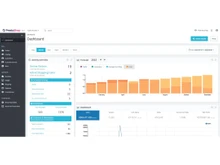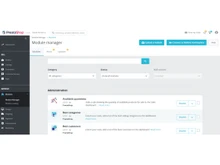How Are PrestaShop and Shopify Different?
PrestaShop is a highly customizable e-commerce software that is open-source. Users can freely design a store, select a hosting company, and add third-party modules to improve functionality. However, PrestaShop necessitates technical expertise, especially for upkeep, modification, and installation. For companies with certain requirements that demand a completely customized e-commerce experience, it is a great option.
Conversely, Shopify is an easily navigable, fully hosted platform. Shopify takes care of everything, so you don't have to worry about security, software upgrades, or hosting. Beginners or companies that wish to focus on managing their store without getting bogged down in the technical aspects would find Shopify ideal. It is a subscription-based service that provides a large number of integrated tools and services.
Comparison Table: PrestaShop vs Shopify
| Comparison of PrestaShop and Shopify |
| Feature |
PrestaShop |
Shopify |
| Ease of Use |
Requires technical knowledge |
Very user-friendly, no coding needed |
| Customization & Flexibility |
Highly customizable, open-source |
Customizable with apps, but less flexible than PrestaShop |
| E-commerce Features |
Robust e-commerce features, but requires modules for advanced functionality |
Extensive built-in features, including marketing tools, payment processing, and shipping integrations |
| Themes & Templates |
Limited themes, but highly customizable |
Wide variety of themes, both free and paid |
| Extensions & Apps |
3,000+ modules (developer-driven) |
6,000+ apps (Shopify App Store) |
| Performance & Scalability |
Depends on hosting, scalable with optimization |
Excellent performance with scalable pricing plans |
| Security |
Security depends on hosting and updates |
Built-in security with SSL certificates and regular updates |
| SEO & Marketing Tools |
Requires modules for SEO and marketing |
Built-in SEO tools, email marketing, and ads integrations |
| Multilingual Support |
Built-in, highly flexible |
Built-in with translation apps |
| Community & Support |
Active developer community, limited customer support |
24/7 customer support, extensive documentation, and community forums |
| Pricing |
Price on request |
Starting at ₹1,994/month |
Detailed Feature Comparison of Shopify vs PrestaShop
- Ease of Use & Learning Curve: PrestaShop is difficult for novices to use and requires technical know-how to set up and install. Even though it allows for complete customization, non-technical users may find it difficult to maintain and control. Coding experience is required, particularly when working with complex features and module integration. On the other hand, beginners are the target audience for Shopify's design. It has an easy-to-use dashboard and a drag-and-drop store builder. There is no coding needed to set up a business, and it is quick and simple.
- Customization & Flexibility: PrestaShop provides total customization control because it is an open-source platform. The code is perfect for companies that need a customized solution because it can be altered to meet your specific requirements. To increase functionality, PrestaShop now accepts third-party modules and custom themes. Although Shopify offers a great deal of customization options through its themes and app store, it is less adaptable than PrestaShop in terms of extensive customizations. Because Shopify is a closed system, more complicated modifications may need working with developers or using third-party apps, but it's usually simpler for non-developers.
- E-commerce Features: Product administration, order processing, and customer management are among the robust e-commerce capabilities that PrestaShop offers. However, more sophisticated features like payment gateways, multi-currency support, and advanced SEO call for additional modules, many of which are more expensive. Shopify has many built-in e-commerce services, such as analytics, shipping connectors, SEO tools, inventory management, and payment processing. Since these services are instantaneous, Shopify is a one-stop shop for the majority of e-commerce companies.
- Themes & Templates: Compared to Shopify, PrestaShop has a more limited variety of themes. With the assistance of a developer or by altering the theme code, you can create a distinctive store, however, because the themes are very flexible. Shopify has a large selection of themes with responsive design and a polished appearance, both free and premium. Store owners can instantly construct a sophisticated storefront by customizing the themes without knowing any code.
- Extensions & Apps: Approximately 3,000 modules are available in PrestaShop to enhance your store's functionality. Even though there is a large library of modules, installing and configuring many of them requires programming skills and is often paid for. With more than 6,000 apps accessible through the Shopify App Store, Shopify provides a vast app ecosystem. These apps make it simple to expand the functionality of your store because they cover everything from accounting to marketing to customer service.
- Performance & Scalability: The efficiency of PrestaShop is mostly determined by your hosting company and the store's optimization. With the right setup, it can manage heavy traffic, but companies will have to deal with scaling problems on their own. Shopify offers outstanding scalability and performance at every price point. Because Shopify is a hosted solution, it takes care of server scalability and performance automatically, so your store can easily accommodate more traffic.
- Security & Compliance: PrestaShop depends on the user to maintain the store's security, which includes handling backups and platform updates. Although it offers security features like SSL certificates, these must be manually set up and maintained. With SSL certificates, PCI-DSS compliance, and frequent software updates, Shopify provides built-in security. Shopify takes care of the platform's security, giving store owners peace of mind.
- SEO & Marketing Tools: Basic SEO features offered by PrestaShop include editable URLs, meta descriptions, and tags. However, you'll need to install extra modules—many of which are paid for—to access advanced SEO capabilities. Strong built-in SEO features in Shopify include SEO-friendly URLs, title tags, and customizable meta tags. To help you expand your store, Shopify also interfaces with several marketing tools, including social network connectors, email marketing platforms, and Google Ads.
- Multilingual & Localization: You may develop stores in several languages using PrestaShop's integrated multilingual support. Additionally, it offers localized shipping choices and multi-currency compatibility, which makes it a great alternative for global organizations. Shopify provides native translation capabilities or multilingual support via apps like Langify. Additionally, it offers shipping choices and multi-currency capabilities, although third-party programs make these features easier to set up.
- Community & Support: Although there is a vibrant development community in PrestaShop, there isn't much customer service available unless you pay for it. Users with technical know-how who can rely on developer resources, tutorials, and community forums are better suited for the platform. Shopify offers live chat, email, and phone assistance around the clock. In addition, a sizable community, tutorials, and a multitude of documentation are available to assist consumers at every step of their e-commerce journey.
PrestaShop vs Shopify: Pricing
Although you can use PrestaShop for free, you will have to pay for web hosting, domain registration, themes, and any other paid modules because it is self-hosted. Depending on your needs and the degree of customization needed, costs can vary greatly. Shopify charges ₹1,994 per month and uses a subscription business model. Depending on the payment method being utilized, premium themes, applications, and transaction fees may result in additional expenses. Although Shopify's prices are more fixed, they might still build up depending on the functionality you require.
Which is Better—PrestaShop or Shopify?
The requirements of your company and your level of technical proficiency will determine which platform is best for you. If you require total control over your online store and possess the technical know-how (or have access to developers) to administer and modify the platform, go with PrestaShop. For companies that require a customized solution and are prepared to manage the setup and upkeep themselves, PrestaShop is perfect. If you want a simple, all-in-one e-commerce platform with little technological complexity, go with Shopify. Shopify's comprehensive features and round-the-clock support make it ideal for businesses looking to get up and running quickly.
Still Not Sure Which E-Commerce Platform to Choose?
Talk to our eCommerce experts at Techjockey to get tailored advice based on your business needs and goals. Whether you need the flexibility of PrestaShop or the ease of use of Shopify, we can help guide your decision!


 4 Ratings & 0 Reviews
4 Ratings & 0 Reviews




















